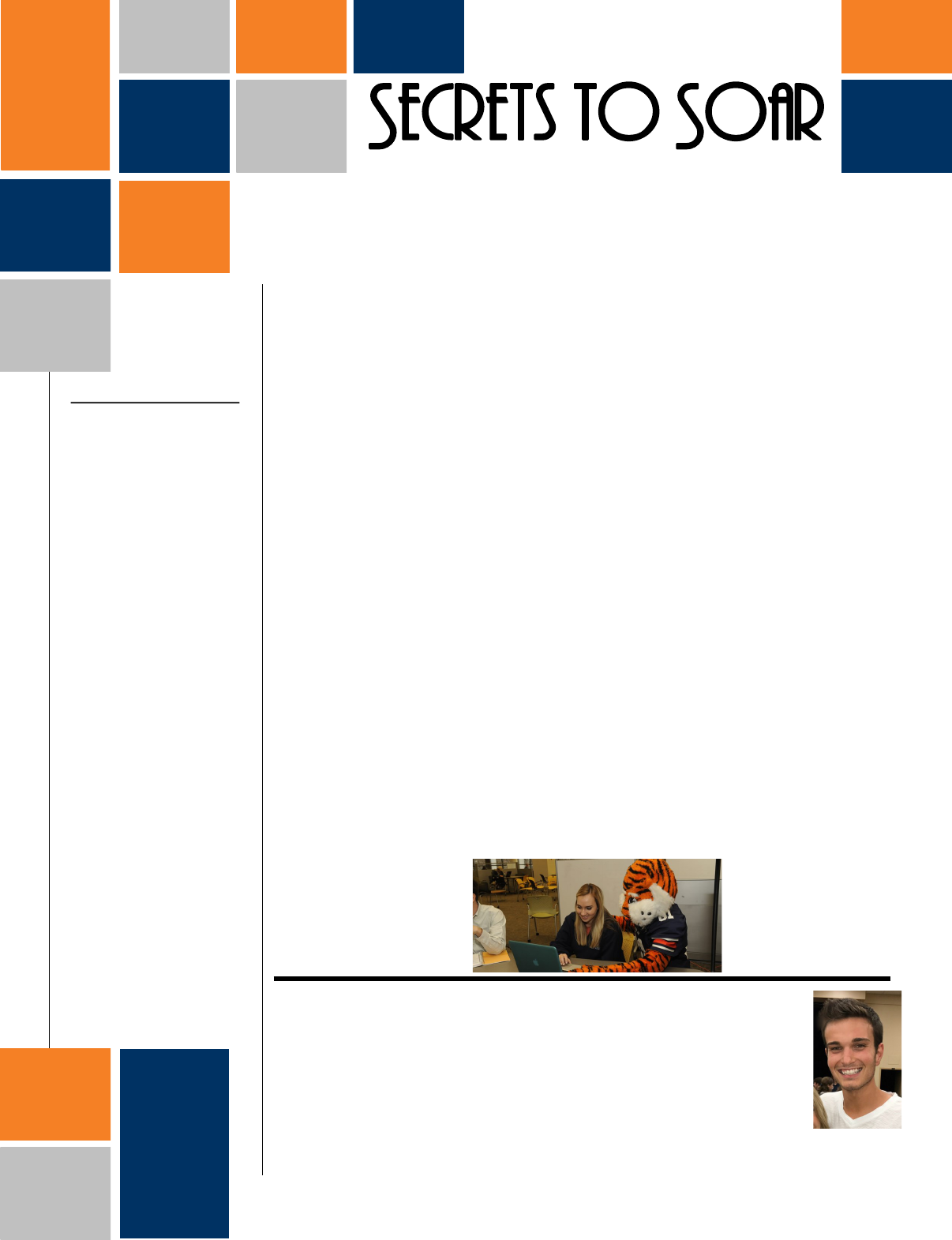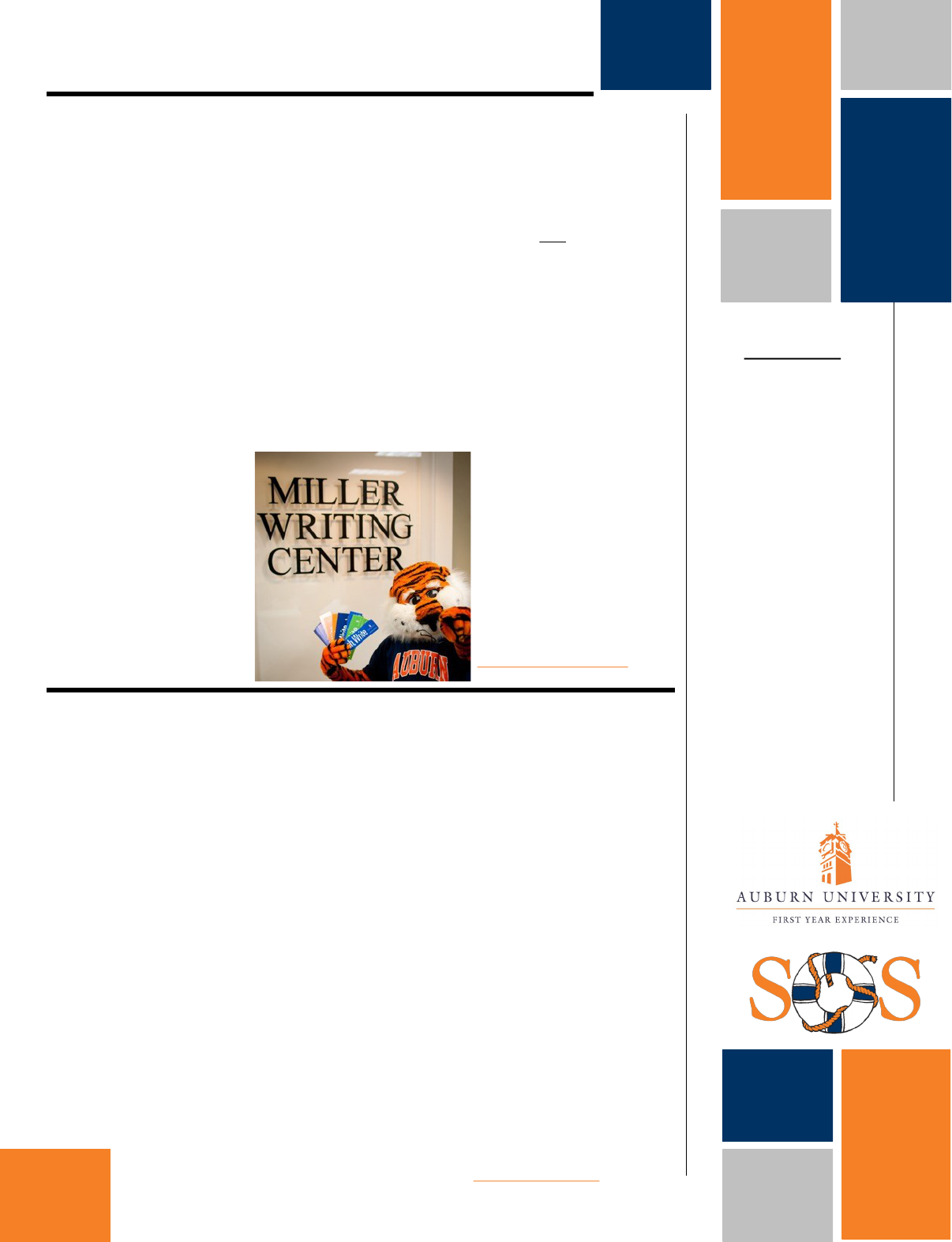
1. Learn your college’s advising
center or advisor’s advising
procedures and schedule.
Each college is different, so
you will need to learn what to
do for your specific major/
minor. One of the best ways to
find this information is by visiting
the homepage of your college.
2. Schedule meetings to check in
with your advisor throughout
the semester and year. We
want to get to know you
better! If you have multiple
advisors (i.e. college, minor,
honors, athletic), it’s important
to check in with each of them
once a semester/year to make
sure you are getting all of the
information you need to
successfully complete all of
your programs.
3. Show up to your advising
appointment on time and
prepared. If you need to make
a list of questions on paper or
on your phone to make sure
you ask everything you need
to, please do it! Be an active
participant during your
advising session by contributing
to the conversation and
taking notes of what was
discussed so you can
reference them later.
4. Familiarize yourself with the AU
Bulletin. It can be a great tool
when it comes to looking for
pre-requisites for a course. This
can be especially helpful as
you start to get into your upper
level major coursework.
5. Don’t be afraid to seek help if
you need it. There are
wonderful academic,
emotional, professional, and
support resources available to
students. If you’re ever unsure
where to go to get the help
you need, your advisor can
help refer you to the
appropriate resources.
6. Be honest when we ask how
things are going. When we ask,
it’s because we truly want to
know how you’re doing. We
are here to help and we want
to help but are unable to do so
if we don’t know there is a
problem.
7. Advisors will not tell you what
to do. We can talk to you
about your options and discuss
the pros and cons but it will
ultimately be up to you to
make the decision.
8. If your college has peer
advisors, use them! They are
one of the best resources
available to learn about
classes for your major and tricks
of the trade when it comes to
balancing academics with a
social life in your specific
college.
9. Be aware of important
academic dates and
deadlines. One of the best
places to go to find this
information is the academic
calendar, which can be found
on the Auburn website.
10. Don’t feel like you have to
follow the curriculum model for
your major exactly as it is
shown. As a transfer student,
your academic path may look
different, which is completely
okay. Regular meetings with
your advisor will help ensure
you are on the right path to
graduate.
11. If something is not clear, ask
for clarification. We sometimes
assume that you may already
understand something but if
you don’t, speak up!
Special thanks to Anna Burchett
an Academic Advisor in the
College of Sciences and
Mathematics for writing this
piece.
A d v i s o r s a r e h e r e t o h e l p !
T o p T i p s f r o m a n A c a d e m i c A d v i s o r
S ept e m b e r 2 0 17
T r a n s f e r S t u d e n t S p o t l i g h t
I n s i d e r Ti p s f o r A uburn’s Transf er S t u d e n t s
Dates To Remember
Aug 28 - Sept 11: Drop Course
Penalty Days. Dropping a class
during this time will result in a $100
fee per course dropped.
Sept 8: Second eBill due.
Statements were posted to your
eBill on August 17. Check AU
Access/eBill for more information.
Sept 11: 15th Class Day: Last day
to drop from a course with no
grade assignment. (See the
second August newsletter for
more details about dropping
classes)
Sept 15-17: Family Weekend
Oct 6: Deadline for Professors to
submit Early Alert/Mid-Term
Grades for all students in Core
and First Year Seminar Classes. This
is a great time to evaluate how
you are doing in each of your
classes and seek help if needed.
Oct 12-13: Fall Break (No Classes)
Oct 19: Deadline to request to
move finals if you have more than
two scheduled on the same day.
You should request this through
your Associate Dean.
Nov 3: Last Day to Withdraw from
a course with no grade penalty.
“W” assigned.
Nov 6: Spring Registration Begins.
Be sure to check AU Access in late
October for your specific
registration time.
hours. Although the class size was much
larger than what I was accustomed to,
the professors were still willing to give one-
on-one attention during their office hours.
I could ask any questions I had and by
going to office hours, I was able to
develop a relationship with my professors
and learn how to be successful in their
class. Don’t miss out on this great
resource because it was critical to my
success here at Auburn.
Transferring to Auburn was a time full of
change, challenge, and excitement. I was
adjusting to a new school, a new town,
and new time management skills. I learned
that with the high paced atmosphere of a
4-year university, I would need to
conscientiously dedicate a substantial
amount of time to each class I was taking
and take an active role in my learning. One
way I did this was through professors’ office
Hunter McCoy
is a Junior majoring
in Public Relations from
Enterprise, AL
First Year Experience • 189 Foy Hall • fyedesk@auburn.edu • 334-844-4501

Since moving to The Loveliest
Village on the Plains, you’ve
probably noticed that Auburn
has a lot of traditions. Drink
Toomer’s Lemonade, say War
Eagle, don’t step on the seal, visit
the Miller Writing Center. It’s true;
Auburn students always come to
the Miller Writing Center to get
help with their papers, projects,
and posters. Drinking lemonade
might make you a better Auburn
fan, but following these writing
tips will definitely make you a
better writer.
Tip #1: Start your assignment
early. Fall semester at Auburn is
busy, busy, busy. Your Saturdays
will disappear quicker than Chick
-fil-A chicken biscuits on Monday
mornings.
Tip #2: Understand your prompt.
It’s so much easier to navigate
Haley Center if you understand
that it’s laid out in quadrants. In
the same way, you will arrive at
the end of your paper faster, and
less frustrated, if you know where
you’re supposed to be going.
Read carefully and don’t be
afraid to ask questions!
Tip #3: Remember your
audience. You wouldn’t yell Roll
Tide or wear crimson and white
at an Auburn football game
because you’d be appealing to
the wrong audience. You yell
War Eagle and wear orange and
blue because that’s appropriate
for the audience. Similarly, you
should use more formal
language in an academic essay
than you do in a text to a friend
or a Facebook post. Do what’s
appropriate for your audience.
Tip #4: Let your voice be heard.
It’s your writing—not anyone
else’s! If your paper requires an
argument or central thesis, you
want it to be assertive. Rather
than writing: I think Aubie is a
pretty good mascot because
he’s a tiger, write: Aubie deserves
the title of best mascot because
of his child-like playfulness and
adorable stripes. Using action
verbs and strong diction can
help you make your thesis strong
and clear.
Tip #5: Come to the Miller Writing
Center! We can help you with
any writing at any part of the
process at any of our seven
wonderful locations. So if you
need help with anything from
biology labs to ePortfolios, make
an appointment with one of our
writing consultants at
auburn.mywconline.com!
point, check with your
Academic Advisor to see if they
can help you check on the
progress of those courses.
EVAL HOL1 “Syllabus Needed for
Evaluation” – This is somewhat
self-explanatory! We just need
more information than what we
have available in order to
evaluate this class. Turn in your
syllabus to your academic
advisor who will get it evaluated
and updated on your transcript.
EVAL HOL2 “Co-Req/
Conditional Evaluation” – This
means we need to manually
check something about this
class in order to award you
credit. For instance, often two
classes from another school
need to be taken in conjunction
for us to award credit (like a
Now that you are here at
Auburn and classes have
begun, it would be a good time
to check your unofficial
transcript on AU Access and see
how your incoming transfer
coursework is listed. Hopefully,
all your transfer courses are
there, and you can see the
corresponding Auburn
equivalents. However, it is
possible you still have a couple
of temporary indicators on your
transfer work showing that it is
still in process. If so, here is a
reminder of what those
indicators mean, and what is
needed to clear them up.
PEND 1111 “Pending Trnsfr
Equiv” – This should only remain
on your transcript for
2-3 weeks for any
one class. After that
science lecture and lab).
Regardless, again just check with
your Academic Advisor about
getting the correct credits
applied to your record.
If you see a notation that simply
says “EVAL HOLD” without
specifying one of the two types
listed above, that just means that
it is one of these two, and your
Advisor can help figure out what
is needed. Ultimately, your
Academic Advisor is there to help
you make sure your academic
records are correct. Additionally,
we here in the Registrar’s Office
are happy to help you if you have
questions. We are in the lower
level of Langdon Hall, off the
courtyard to the side of the
building. Come see us anytime, or
feel free to email us if you have
any questions at
W r i t i n g T i p s f r o m t h e M i l l e r W r i t i n g C e n t e r
B y : J a m i e M c C l i n t o c k , U n d e r g r a d u a t e P e e r W r i t i n g C o n s u l t a n t
A W o r d f r o m t h e O f f i c e o f t h e R e g i s t r a r a b o u t
T r a n s f e r C r e d i t
B y : C a r y C u r t i s s , U n i v e r s i t y T r a n s c r i p t E v a l u a t o r
Secrets to Soar
First Year Experience • 189 Foy Hall • fyedesk@auburn.edu • 334-844-4501
Transfer Tip:
Did you know the Career
Center has drop in hours?
You can get immediate
assistance Monday
through Friday from 9-4pm
in Mary Martin Hall (room
303). If additional help is
needed, they’ll help you
make an appointment
with a Career Counselor.
The Auburn Career Center
can help you explore
majors and career paths,
find opportunities to gain
experience (through jobs
and internships), market
yourself through a strong
resume and cover letter,
practice for a job
interview, and help land a
job through Handshake
(Auburn’s job posting
platform).
